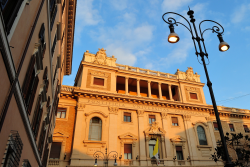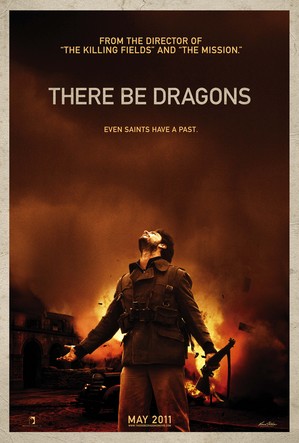
“Building a New World” is new initiative Interdisciplinary Centre for Social Communications of the Pontifical Gregorian University (Rome, Italy) beginning today, Friday, 2 March.
This project is focused on film and the power film has in our lives. The premise is: a good film liberates, forms and calls us to a new way of seeing and engaging in reality. Therefore, the good people at the Gregorian are exploring how a good movie or documentary can invite people to greatness through the imagination and research how a poorly written movie with mediocre images can severely handicap one’s openness to the true, the beautiful and the good. Just think of the good Father Robert Barron’s “Catholicism” project is doing for those learning the Catholic faith for the first time or those renewing their faith; or how damaging “The Deputy” was to to the person of Pope Pius XII and the rest of the Church.
Jesuit Father Lloyd Baugh, a professor of film, told Vatican Radio that the initiative honors the 30th anniversary of the University’s Center for Interdisciplinary Study. It is popular these days to get at human, theological and philosphical issues by the use of film. Friends of mine do it regularly in the schools in which they instruct young minds: Benedictine Father Bede Price teaches a theology and film course at his abbey’s Priory School (St Louis, MO) and Jesuit Father Edward Oakes does so at Mundelein Seminary (outside Chicago, IL). Father Baugh he teaches theology using film as the text for class: Christology through the “Jesus films,” moral issues through the “The Decalogue” of Kieslowski, interreligious dialogue through a whole series of films from different religious traditions and so on.
The current cycle of films starting today will be inaugurated by the Gregorian University Rector Jesuit Father Dumortier, Archbishop Claudio Celli, President of the Pontifical Council for Social Communications, of Jesuit Father Savarimuthu, director of the Centre for Interdisciplinary Studies at the Gregorian University, and Father Baugh.
The first film is “Welcome.” which focuses on a young Kurdish boy who attempts to illegally enter England, and in doing so encounters other people changing their vision of the world, and ultimately their lives. “Welcome” is a award 2009 winning film directed by Philippe Loiret.
Other films include
March 23: “Water” (2005 Deepa Mehta film) focuses on Asia and on “the right to Freedom” drawing attention to the tragic reality of millions of young girls in India who are promised in marriage to elderly men and widowed shortly thereafter, leaving them destitute for the rest of their lives.
April 20: “La Zona” (2007 Roderigo Pla film) dedicated to the “Americas” and to the “right to Justice”, highlighting the persistent and ever-growing disparity between rich and poor particualrly in Latin America.
May 4: “Son of Man” (2006 Mark Dornford May) looks at the plight of the African continent and its “right to Hope”. May directs a narrative of the Gospel and situating the contemporaneous of the biblical reality of a township outside of Cape Town. The desire for peace is continuously punctuated by violence. It is a look at how Jesus would respond to the human reality before his eyes and what he does to change people’s hearts.
Screenings are free and everyone is welcome. For more information visit: www.unigre.it


